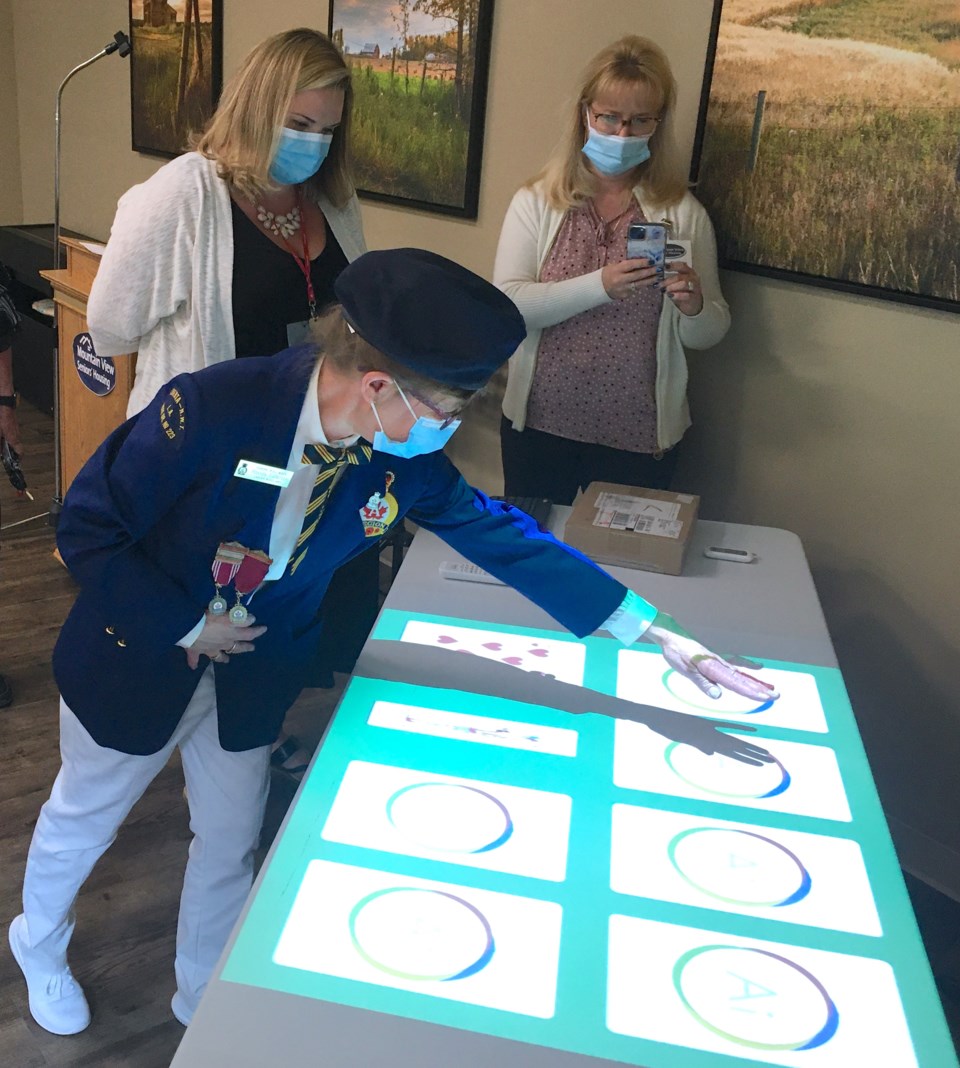SUNDRE – A new device designed to help stimulate senses and cognitive functions in an effort to stave off the effects of dementia represents the first of its kind among Mountain View Seniors’ Housing (MVSH) lodges and care centres.
“No other MVSH facilities have one,” said Jessica Chapman, site general manager at the Sundre Seniors’ Supportive Living Facility, in response to emailed questions.
Known as a Lucynt Magic Table, the unit was installed in early May and later unveiled on Friday, May 19 during an informal unveiling with municipal officials present as well as members of community service organizations that contributed funding toward making the project possible.
“It is a projection unit that is touch sensitive,” explained Chapman, adding the display can be projected onto either a table, wall or floor to play a wide variety of games that are focused on all of the stages of dementia.
The acquisition was made possible courtesy of the Foothills Lodge Auxiliary Association, which both helped raise funds as well as facilitated donations from other local groups including the Catholic Women’s League, the Royal Canadian Legion Sundre Branch #223 as well as the legion’s Ladies Auxiliary and the municipality, she said.
“Our organization feels extremely grateful to be able to utilize this piece of sensory technology,” she said in response to being asked her thoughts on obtaining the new device and how it could benefit residents.
“We have the ability to leave the Magic Table running while unattended and it will switch through games based on a playlist,” she said. “We are able to customize the playlists or choose from the early-, mid- and late-stage preloaded playlists. This sort of technology is said to promote cognitive reasoning and increased alertness with residents that have dementia.”
While the unit is mobile and versatile enough to move around the building, the device will primarily be set up in a permanent station in the facility’s Dementia Safe Unit (SL4D) as that is the demographic it is designed and intended for, she said.
“It can also be used on the floor as a game that they use their feet while sitting, or projected onto a wall for a game while standing,” she said.
Chapman said the Lucynt Magic Table came to their attention last fall while conducting research on options to bring into the facility a sensory stimulation device specifically for the SL4D unit. That effort was made possible due to the large donation that was intended to be allocated toward a different kind of interactive device, she said.
“We chose this unit over the original idea because of its versatility and the easy-to-use platform,” she said.
“The magic table is plug-and-play, so it takes less time (to) set-up and maintain than other interactive sensory devices that we have researched.”
Prior to committing to the purchase, Chapman said she had the opportunity to try out one of the magic tables at a trial run that was facilitated through a Calgary care centre that had purchased a unit.
According to the company that makes the magic table, the Lucynt device uses sound and imaging to create a “relaxing environment that promotes fun, activity, and cognitive stimulation.”
The variety of games – there are more than 150 – provide opportunities to focus on different cognitive functions such as hand-eye coordination, memory recall, or even gaming among group participation, with the overall end goal of fostering “positive results in the areas of emotion, social interaction, and physical activity.”
The device is also billed as being able to help calm down the overactive as well as engage the distant, and also offers an opportunity for intergenerational play.
“It’s fun for the cognitively impaired, their loved ones, and all those involved in the care-giving process,” reads a portion of the Lucynt website.



